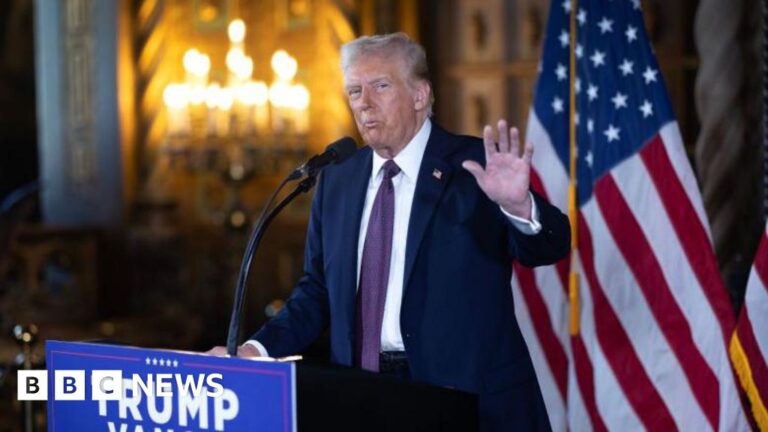Getty Images
Tariffs are at the heart of Donald Trump’s economic vision
The global economy is expected to grow at its slowest pace in six years this year due to concerns that US tariffs will hit trade, the World Bank has warned.
Growth of 2.7% would be the weakest performance since 2019, apart from the sharp contraction observed at the height of the Covid pandemic.
This is a rate with which the world can “live” according to the bank’s deputy chief economist, Ayhan Kose, but which would not be enough to improve the standard of living of populations, both in rich countries and in poor countries.
He warned that tariffs, which President-elect Donald Trump has threatened to introduce on imports to the United States, could have global economic consequences.
The prospect of higher taxes on U.S. imports worries many world leaders because it will make it more expensive for companies to sell their products in the world’s largest economy.
Tariffs are a central part of Trump’s economic vision – he sees them as a way to grow the US economy, protect jobs and increase tax revenue – and has threatened to impose tariffs against China, Canada and Mexico on the first day of his presidency next week.
The United States is the world’s largest importer. China, Mexico and Canada account for around 40% of the $3.2 trillion (£2.6 billion) worth of goods imported each year, according to official data.
Mr Kose said “escalating trade tensions between major economies” was one of the bank’s biggest fears for the global economy in 2025. The World Bank aims to foster long-term economic development.
Other concerns include interest rates remaining high for longer and increased political uncertainty undermining business confidence and investment.
The World Bank said that even a 10% increase in U.S. tariffs on imports from all countries would reduce global economic growth by 0.2% if countries did not fight back. If they did, the global economy could be hit harder, Mr. Kose added.
“Whenever you introduce restrictions on trade, there will be negative consequences that will most often be borne by the country that introduced them,” he said.
Mr Kose said the low growth rate forecast for the global economy in 2025 meant living standards would not improve “at the rate we have seen in the past”.
He pointed out that in the decade before the pandemic, growth averaged more than 3% per year.
“If we look over a longer period, we think that the growth figures will decline. This worries us,” he added.
Economic growth is widely seen as essential to reducing poverty and financing public services such as health and education.
It is also key to creating jobs and raising wages, at a time when inflation remains above the 2% target set by the central banks of the Eurozone, the UK and the US.
Governments around the world are grappling with different methods to boost economic growth, and Mr Kose warned there are no magic solutions.
“At the end of the day, there is no goal of economic growth. Countries need to think about what policies to implement,” he said.
In the UK, the government is moving towards the artificial intelligence sector, while in the US, Trump wants to cut taxes and regulations.
Increasing production capacity is India’s priority, but China is taking steps to increase consumer spending.

